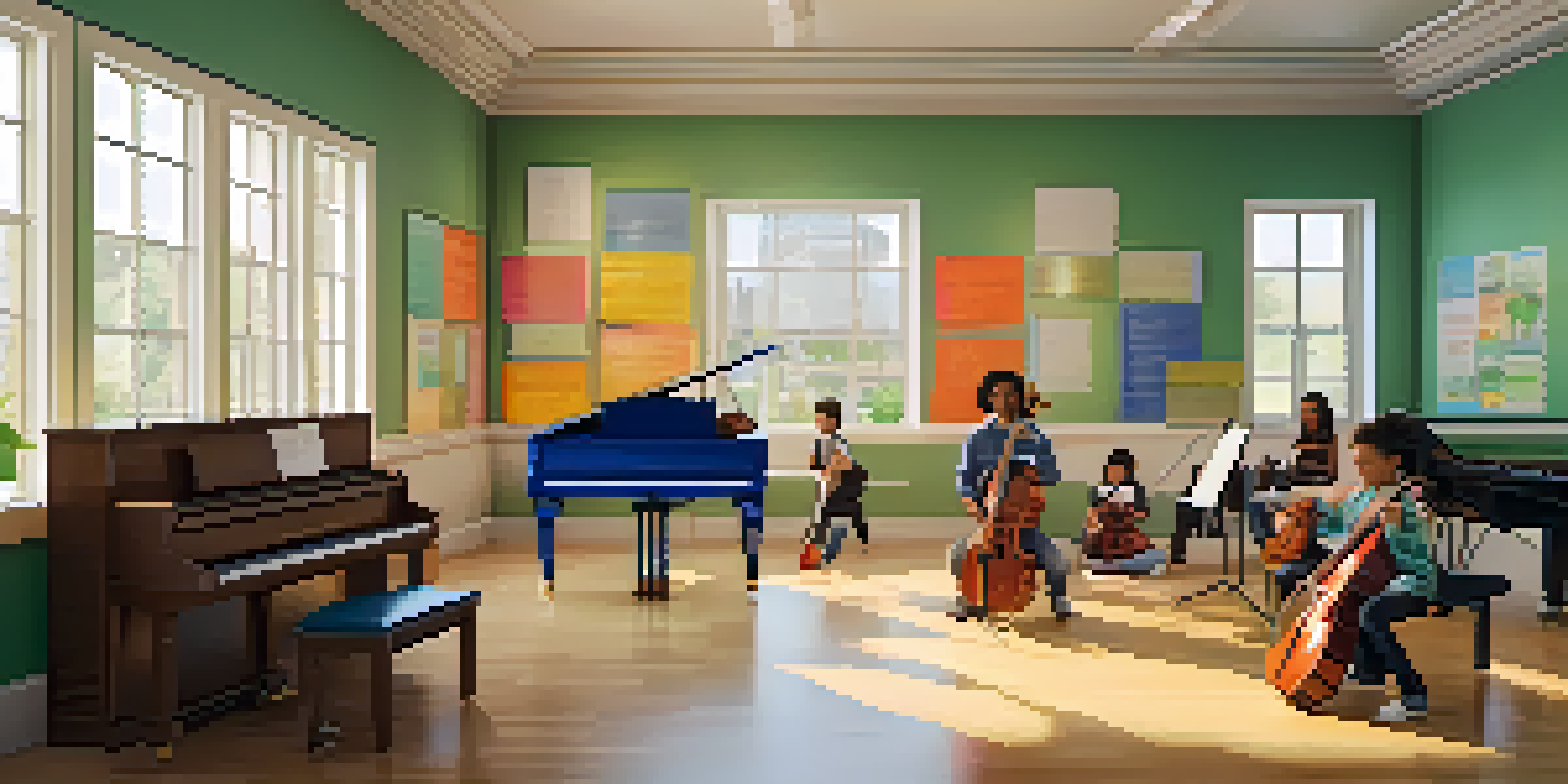Understanding the Role of Music Education in Lifelong Wellness

The Connection Between Music and Emotional Wellness
Music has a unique ability to resonate with our emotions, making it a powerful tool for emotional wellness. Engaging with music, whether through listening or playing an instrument, can help individuals process feelings and relieve stress. For instance, a student learning to play the piano might find that expressing their emotions through music serves as a healthy outlet during tough times.
Music can change the world because it can change people.
Research shows that music can help reduce anxiety and depression, creating a sense of belonging and community among learners. When students participate in group music activities, they often forge strong bonds with their peers, fostering a supportive environment. This social aspect is crucial, as feeling connected to others is a key element of emotional health.
Moreover, music education encourages self-expression and creativity, allowing individuals to explore their identities. This can lead to increased self-esteem, as students gain confidence in their abilities to create and share music with others. Ultimately, nurturing emotional wellness through music can contribute positively to lifelong mental health.
Cognitive Benefits of Learning Music
Learning music isn't just about hitting the right notes; it also has significant cognitive benefits. Studies indicate that music education can enhance memory, attention, and even problem-solving skills. For example, children who learn to read music can develop better reading skills overall, as both activities require similar cognitive functions.

Engaging with music requires the brain to process complex information, improving overall cognitive flexibility. This mental workout is akin to exercising a muscle, leading to better performance in academic and everyday tasks. As students learn about rhythm, melody, and harmony, they also practice critical thinking and analytical skills.
Music Enhances Emotional Wellness
Engaging with music provides a powerful outlet for processing emotions, reducing anxiety, and fostering connections among individuals.
Additionally, the discipline of regular practice fosters perseverance and patience, traits that are beneficial in all aspects of life. As students navigate challenges in learning an instrument, they develop a growth mindset, which can be applied to future obstacles. Thus, the cognitive gains from music education extend far beyond the classroom.
Physical Health Benefits of Music Education
Music education can also play a vital role in promoting physical health. Participating in music, especially with instruments that require physical movement, can enhance coordination and motor skills. For instance, drumming not only engages the hands but also involves the entire body, making it a great way to improve physical fitness.
Where words fail, music speaks.
Moreover, playing music can increase lung capacity and improve breathing, particularly when it comes to wind instruments. This physical engagement has been linked to better cardiovascular health over time. Students who participate in band or orchestra settings often find they are more active, as they carry equipment and move about during practice and performances.
In essence, music education encourages a more active lifestyle, providing an enjoyable alternative to sedentary activities. When children and adults engage in music, they not only stimulate their minds but also keep their bodies in motion, contributing to an overall healthier lifestyle.
Social Skills Development Through Music
Engaging in music education can significantly enhance social skills, making it a valuable aspect of personal development. Students who participate in ensembles or group lessons learn collaboration and teamwork, essential skills in both personal and professional settings. For instance, playing in a band requires individuals to listen to one another and adapt, fostering a sense of unity.
Additionally, music education often creates opportunities for social interaction through performances and recitals. These events help students build confidence in public speaking and presentation skills, which are beneficial in various life scenarios. The connections made in these settings can lead to lifelong friendships, further enriching one’s social life.
Cognitive Skills Boosted by Music
Learning music enhances memory, attention, and problem-solving skills, benefiting academic performance and critical thinking.
Furthermore, music programs often emphasize the importance of empathy and understanding others' perspectives. By performing and appreciating diverse musical styles, students learn to value different cultures and backgrounds. This exposure broadens their worldview and cultivates a more inclusive mindset.
Music Education as a Stress Relief Tool
In today's fast-paced world, finding effective stress relief methods is crucial, and music education can be a great solution. Playing an instrument or singing provides an outlet for expression, allowing individuals to channel their stress into creative energy. For example, many people find that strumming a guitar or playing the violin helps them unwind after a long day.
Research suggests that engaging with music can lower cortisol levels, the hormone associated with stress. This physiological response contributes to a sense of calm and relaxation, making music education not just an artistic pursuit but also a therapeutic one. As students immerse themselves in music, they often find a sanctuary away from daily pressures.
Moreover, the rhythm and structure of music can provide a comforting routine, which is especially beneficial in stressful times. When students regularly engage with music, they create a predictable environment that can reduce anxiety. Thus, music education serves as both a creative outlet and a practical strategy for stress management.
Fostering Lifelong Learning Through Music
Music education instills a love for learning that can last a lifetime. When students engage with music, they often develop a curiosity that extends beyond the classroom, encouraging them to explore new instruments, genres, and musical theories. This ongoing exploration fosters a growth mindset, where individuals view learning as a continuous journey.
Additionally, the skills acquired through music education—like discipline, time management, and goal-setting—are transferable to many areas of life. For instance, a student who practices regularly will learn to set achievable goals and persistently work towards them. These habits can benefit their academic pursuits and personal objectives.
Music Builds Community Connections
Participation in music education fosters a sense of belonging and collaboration, enriching social skills and cultural appreciation.
Ultimately, music education equips individuals with the tools to approach challenges with confidence and resilience. By nurturing a passion for learning, music education lays the groundwork for lifelong growth and personal development, enhancing overall well-being.
The Role of Community in Music Education
Community plays a significant role in enhancing the benefits of music education. Local music programs and schools often foster a sense of belonging among participants, creating an environment where everyone is encouraged to learn and grow together. This shared experience strengthens relationships and builds a supportive network that can last a lifetime.
Moreover, community involvement in music education, such as concerts and festivals, promotes cultural appreciation and engagement. Events that showcase students’ talents not only boost their confidence but also allow them to connect with their communities in meaningful ways. For example, a local talent show can bring together diverse groups, celebrating the power of music to unite people.

In essence, the community aspect of music education enhances its impact on lifelong wellness. By participating in music programs, individuals not only develop their skills but also contribute to a vibrant community, creating a rich tapestry of shared experiences that can uplift and inspire.